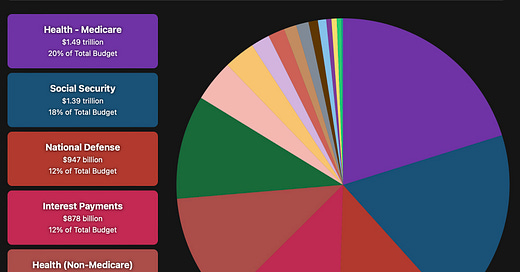How Else to Judge Systems
[Trivia: What does Wikipedia identify as “by far the most widely spoken non-official language in Israel”?]
One other principle for judging systems, which I was dancing around yesterday, is: systems need to be judged against comparable systems. More broadly, this also goes for any earthly subject matter, but it also applies here.
I think the biggest pitfall here is how easy it is to identify imperfections in government. Voter knowledge of issues, for example, is a very “sophisticated” thing to care about and decry—but if the most exemplary or informed democracy you can find is only marginally better, then it’s not a fair or prudent criticism to level.
More controversially, this can also apply to types of government spending. Ben Shapiro’s made the point (somewhere) that when the Tea Party seized control of Congress in 2010, one of their big targets was “porkbarrel” spending: line-item expenses earmarked for vanity projects, often infrastructure with their names on it in their home districts. This was a cartoonish waste of money.
It’s also the sort of carrot you need to entice politicians, who depend on electoral popularity, to undo generally popular Problem Programs like, I don’t know, the never-repealed Affordable Care Act—to say nothing of that Ponzi scheme, Social Security.
And keep in mind the perspective here: all of this porkbarrel spending, however wasteful, is a thin slice of the pie. Here’s a visualization of that pie, the 2023 federal government’s budget (both mandatory and discretionary spending), courtesy of the University of New Hampshire.
Medicare and Medicaid combine for nearly a third of the federal budget; Social Security on its own is nearly a fifth; defense—which is one of the jobs that this government was actually created to perform—accounts for just 12% here, although for the past couple decades it’s usually closer to 20% or 15%. All of the named vanity projects—this is not the stuff driving the national debt.
So conservatives zealous to do something wound up scrapping a system where lots of relatively slim line items gave politicians a reason to pursue an agenda in favor of, it would seem, a system where politicians would uproot popular redistributionist programs, cheerfully expect nothing in return, and also hold onto their seats from rivals who might better entice voters with what goodies they could bring home.
About that second point: FiveThirtyEight has pointed out in the past, and the NYT revisited the point today, that “fiscally liberal, socially conservative” is actually a really popular position in American politics. It’s far more popular than the “fiscally conservative, socially liberal” stance that is in vogue with a lot of—highly-visible—celebrities or the bien-pense crowd. Check out their scatter plot: the upper left corner overwhelms the lower right.
NYT, “The Morning,” May 25, 2023
Again—compare systems to relevant comparanda (“things to be compared”). You can see individual lawmakers act better or worse on this one pork-barrel metric. It’s hard to find a worse one than Ku Klux Klan “Exalted Cyclops” and Obamacare-voting US Senator Robert Byrd of West Virginia. Just check out Wikipedia’s “List of places named after Robert Byrd” sometime.
I didn’t know West Virginia had this many places.
~
Answer: Russian. Modern Hebrew is official and ubiquitous, and Arabic, which has a “special status” in Israeli law, is spoken by only slightly more Israelis than Russian is (about 20% compared to 15%).





